December 9, 2020
Search Results for: wellbeing
December 8, 2020
Businesses risk losing top talent due to poor mental health support
by Jayne Smith • News, Wellbeing, Working lives
 Almost half of UK businesses have seen an employee move on because their mental health wasn’t being looked after, with a quarter losing a key member of their workforce, according to new research from healthcare provider, Benenden Health. More →
Almost half of UK businesses have seen an employee move on because their mental health wasn’t being looked after, with a quarter losing a key member of their workforce, according to new research from healthcare provider, Benenden Health. More →
December 8, 2020
Plans for 2 million sq. ft of offices in South East England
by Jayne Smith • Business, News, Property
 The Commercial Park Group, a partnership between Sir Robert McAlpine and the John Baker Group, has announced it will invest £200 million to kick-start developments of two million sq ft of new offices across locations in the south east of England. More →
The Commercial Park Group, a partnership between Sir Robert McAlpine and the John Baker Group, has announced it will invest £200 million to kick-start developments of two million sq ft of new offices across locations in the south east of England. More →
November 26, 2020
People still struggling with shift to remote living
by Jayne Smith • News, Technology, Wellbeing
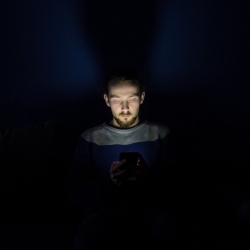 A lack of balance through lockdown has been felt most dramatically by Brits living in house shares according to new research released by Microsoft Windows. The research claims that over 40 percent of people living with house mates, friends or professionals are finding it increasingly difficult to destress and unwind after a long and challenging day; while a further 1 in 5 of the UK population admit that work and play has become blurred in 2020. More →
A lack of balance through lockdown has been felt most dramatically by Brits living in house shares according to new research released by Microsoft Windows. The research claims that over 40 percent of people living with house mates, friends or professionals are finding it increasingly difficult to destress and unwind after a long and challenging day; while a further 1 in 5 of the UK population admit that work and play has become blurred in 2020. More →
November 25, 2020
Third of people working from home worry about mental health
by Jayne Smith • News, Wellbeing, Working lives
 In a recent survey of 4,000 office-based employees and 1,000 employers in the UK, U.S, Singapore and the UAE, a third of employees expressed concern for their mental health whilst working from home during the COVID-19 pandemic. The research, conducted by health benefits provider, Aetna International, examines the perceptions of both employers and employees when it comes to corporate health and well-being. More →
In a recent survey of 4,000 office-based employees and 1,000 employers in the UK, U.S, Singapore and the UAE, a third of employees expressed concern for their mental health whilst working from home during the COVID-19 pandemic. The research, conducted by health benefits provider, Aetna International, examines the perceptions of both employers and employees when it comes to corporate health and well-being. More →
November 24, 2020
Work really has become much harder during the pandemic
by Eva Selenko • Features, Flexible working, Wellbeing
 The pandemic has seriously altered how we work. According to statistics published by the International Labour Organization (ILO) in September 2020, US$35 trillion (£26 trillion) has been lost globally in labour income. There has also been an estimated loss of 17 percent of working hours worldwide since 2019, with young people and women being hit hardest. And many of those still in jobs are working under very different conditions. More →
The pandemic has seriously altered how we work. According to statistics published by the International Labour Organization (ILO) in September 2020, US$35 trillion (£26 trillion) has been lost globally in labour income. There has also been an estimated loss of 17 percent of working hours worldwide since 2019, with young people and women being hit hardest. And many of those still in jobs are working under very different conditions. More →
November 24, 2020
Legal and mental health concerns mount as businesses brace for redundancies
by Jayne Smith • Business, News, Wellbeing, Workplace
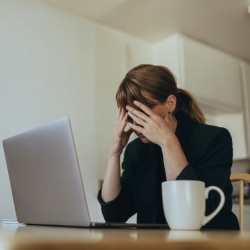 Despite the last-minute extension of the furlough scheme, new research conducted among UK business leaders claims that great concern remains around making redundancies and in particular the legal risk. The survey of over 440 UK business leaders, conducted by employment law and HR support firm Ellis Whittam, also claims two-thirds (66 percent) believe the prospect of making redundancies has negatively impacted their mental wellbeing. More →
Despite the last-minute extension of the furlough scheme, new research conducted among UK business leaders claims that great concern remains around making redundancies and in particular the legal risk. The survey of over 440 UK business leaders, conducted by employment law and HR support firm Ellis Whittam, also claims two-thirds (66 percent) believe the prospect of making redundancies has negatively impacted their mental wellbeing. More →
November 24, 2020
Covid-19 will transform the way technology is used in offices
by Jayne Smith • News, Technology
 A new paper from the British Council for Offices outlines how technology is being used in offices to combat Covid-19. While offices may be shut in the UK until 2nd December at the earliest, the paper outlines how the sector is adapting and embracing a range of new technology to ensure that offices can comply with hygiene and social distancing measures. More →
A new paper from the British Council for Offices outlines how technology is being used in offices to combat Covid-19. While offices may be shut in the UK until 2nd December at the earliest, the paper outlines how the sector is adapting and embracing a range of new technology to ensure that offices can comply with hygiene and social distancing measures. More →
November 23, 2020
The crisis is making us more authentically human at work
by Jill Dark • Comment, Flexible working, Wellbeing, Workplace design
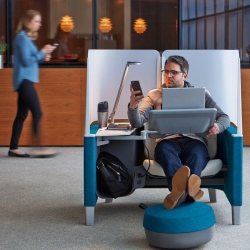 Let the dogs bark, let the kid dance, admit that you are in the basement because your spouse is occupying the kitchen. It takes bravery to let the new reality shine. In previous circumstances, your dog starting to bark like crazy while you are on a work video call with the CEO of a company may have been mortifying. But now, instead, the shared reality of both participants working from home gives employees and employers the chance to gain a little more insight into each other’s lives. More →
Let the dogs bark, let the kid dance, admit that you are in the basement because your spouse is occupying the kitchen. It takes bravery to let the new reality shine. In previous circumstances, your dog starting to bark like crazy while you are on a work video call with the CEO of a company may have been mortifying. But now, instead, the shared reality of both participants working from home gives employees and employers the chance to gain a little more insight into each other’s lives. More →
November 23, 2020
Mental health issues in young fathers caused by a lack of support in work and educational settings
by Jayne Smith • News, Wellbeing, Working culture
 New research published by Leeds Trinity University and parenting platform DaddiLife claims that young fathers face preventable barriers when accessing education and employment, leaving some in vulnerable positions with an increased risk of facing mental health issues. More →
New research published by Leeds Trinity University and parenting platform DaddiLife claims that young fathers face preventable barriers when accessing education and employment, leaving some in vulnerable positions with an increased risk of facing mental health issues. More →
November 23, 2020
Younger workers suffer most from remote working, new study claims
by Jayne Smith • Flexible working, News, Wellbeing, Working lives
 Staff need on average three days a week (2.91) in the office to achieve maximum productivity, according to a new study by ISG. In results from the UK-wide “The Power of Place” study examining the future of the workplace, employees believed that spending on average three days a week in the office would be optimal for productivity. When asked how many days they thought would be needed to optimise their wellbeing, workers cited on average over half a day less, 2.34 days per week, in the office. More →
Staff need on average three days a week (2.91) in the office to achieve maximum productivity, according to a new study by ISG. In results from the UK-wide “The Power of Place” study examining the future of the workplace, employees believed that spending on average three days a week in the office would be optimal for productivity. When asked how many days they thought would be needed to optimise their wellbeing, workers cited on average over half a day less, 2.34 days per week, in the office. More →





 Heightened anxiety during the Covid-19 pandemic has led to employees working longer hours and taking fewer sick days, all the while becoming less fulfilled by work and life, according to the latest analysis from
Heightened anxiety during the Covid-19 pandemic has led to employees working longer hours and taking fewer sick days, all the while becoming less fulfilled by work and life, according to the latest analysis from 




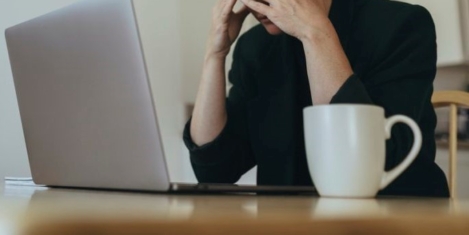

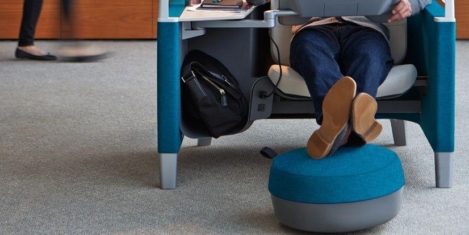












December 2, 2020
Creative firms have most to lose from a loss of serendipity
by Gary Chandler • Comment, Workplace design